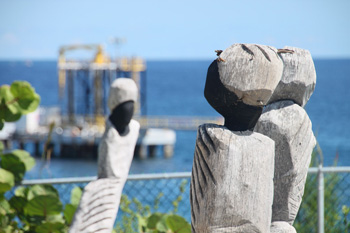capitalism, colonialism, history, Latin America, Panama, racism, slavery, society, travel
Independence Day
Panama City. Friday night. The old town, the Casco Viejo, the historical centre of the city. It is raining. In fact it’s pouring. The weather forecast shows 32 or 33 degrees with torrential thunderstorms for the next six days.
I sit in the white brightly-lit bandstand in the centre of the central square, the Plaza de la Independencia. This is where Panamá declared its “independence” from Colombia in 1903. At that time all of Panama City was contained within the Casco Viejo. Within a few years the Canal was creating a boom and the city expanded. Today this area is barely more than an urban slum with the trappings of past wealth, not alike the centre of Havana, Cuba. Tonight, the plaza is practically deserted.
My photo set “Panama City Contrasts” on flickr
Below, still guarding their jewellery stall in the twilight are two indigenous Kuna people, the woman immediately recognisable with her colourful blouse, gold piercings and naked tightly-beaded calves. Above in the bandstand with me squat two gringos around their laptops, taking advantage of the bandstand’s power outlets. I think they live in the large van I saw on the corner. Something tells me they’re running Linux. Two dogs join us, one belonging to the gringos. A middle-aged Panamanian asks the gringos what their dog is called. She misunderstands him and gives him her name. I think she is Australian. He is shaving his face, very slowly and without a mirror. He has two different razors, as if he fears one might not do the job. It is unclear to me whether he has any water, or soap. He picks slowly to remove hairs from the blade. I think he might be also charging his phone. I presume he has a home, but his shoes are held together with neat loops of string. For all I know everything he owns could be in the carrier bag beside him. Continue Reading »
20 Jul 2012 Matt Wootton 1 comment
